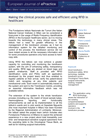 The Fondazione Istituto Nazionale dei Tumori (the Italian National Cancer Institute) in Milan can be considered a forerunner in the usage of Radio Frequency Identification (RFID) in the European healthcare sector, as it is moving towards this technology in many clinical areas. The Istituto had a need for greater efficiency in the management of the transfusion process, as it had no information system for the detailed monitoring and control of the process; the transfusion service did not have instant access to all the necessary information and for some procedures operators only have access to hardcopy aids.
The Fondazione Istituto Nazionale dei Tumori (the Italian National Cancer Institute) in Milan can be considered a forerunner in the usage of Radio Frequency Identification (RFID) in the European healthcare sector, as it is moving towards this technology in many clinical areas. The Istituto had a need for greater efficiency in the management of the transfusion process, as it had no information system for the detailed monitoring and control of the process; the transfusion service did not have instant access to all the necessary information and for some procedures operators only have access to hardcopy aids. Using RFID the Istituto can now achieve a greater capacity for controlling and monitoring the transfusion system, with the aim of enhancing safety, transparency and quality. RFID tags are sticked on blood bags and patient wristbands. Staff is provided with RFID identification cards and PDAs (with an application developed by the project team) and thus enabled to register patients at their arrival, verify the patient-blood match and recognise at any time patients and transfusional units. Each event is automatically traced by the system and sent to the Transfusion Centre, providing an essential informative feedback which was not available before.
Download Making the clinical process safe and efficient using RFID in healthcare (.pdf, 527 KB)
For further information, please visit:
http://www.epracticejournal.eu
Related news articles:
About The European Journal of ePractice
The European Journal of ePractice is a peer-reviewed online publication on eTransformation, launched in November 2007. The Journal belongs to the ePractice.eu community, is sponsored by the European Commission as part of its good practice exchange activity and is run by an independent Editorial Board.
The aim of European Journal of ePractice (EjeP) is to reinforce the visibility of articles as well as that of professionals in eTransformation building an author's community which will strengthen the overall ePractice.eu activity. The publication will promote the diffusion and exchange of good practice in eGovernment, eHealth and eInclusion and will be open access, free of charge to all readers. We have a target audience of 50,000 professionals in Europe and beyond, and build on a community of some 12,000 members. For further information, please visit www.epracticejournal.eu.
About ePractice.eu
ePractice.eu is a portal created by the European Commission which offers a new service for the professional community of eGovernment, eInclusion and eHealth practitioners. It is an interactive initiative that empowers its users to discuss and influence open government, policy-making and the way in which public administrations operate and deliver services. For further information, please visit www.epractice.eu.